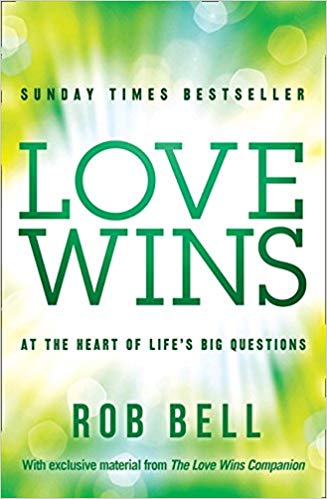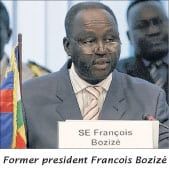Part One (March 2013)
‘Earth to earth, ashes to ashes, dust to dust, in sure and certain hope’ … for everyone?

Sadly many ministers responsible for conducting funerals commit a terrible, destructive sin, by providing a ‘sure and certain hope’ of heaven to grieving friends and relatives, when the evidence from the life of the deceased gave no foundation for it.
Tragically, such false comfort also gives the impression to everyone at the funeral that all will be well in the end for them too! This is a desperately dangerous, false witness to those without saving faith in Christ.
Heresy
Two years ago, Rob Bell in his bestselling book Love wins took this type of sin to a whole new level. He created confusion and propagated outright heresy to millions around the world.
This month (March 2013), he intends to rub salt further into the wounds with the release of Love wins for teens, which, we assume, will carry a similar gospel-eroding message.
Bell waters down and twists the gospel message to make it more palatable to all, while erasing any threat of God’s judgement and of a literal and eternal hell.
Wouldn’t all preachers like to be able to present hope when there is none? Wouldn’t all preachers like more people to be saved? Of course … but only if it is a sure hope and a true salvation!
But Rob Bell in his book presents a message which denies the clear teaching of Scripture, especially relating to how we can be saved and what our eternal destiny will be. What he teaches is not the truth of the gospel.
The clarity of the gospel message is of infinite importance and urgency, for one by one we will leave this world and pass into eternity. Each of us then will face judgement and one of two eternal destinations — heaven or hell.
Our final destiny depends on whether, in this life, we have repented and believed in the finished work of Christ for the forgiveness of our sin. So presenting the truth in these areas is of vital importance; it is the difference between eternal life and eternal death.
Rob Bell’s book, which presents a vastly different message to the Bible’s, has sold millions of copies, has been promoted across media channels, and, on 25 April 2011, even made the front page of Time Magazine with the headline ‘What if there’s no hell?’
The end result is that countless people will have a false hope about their own eternal destiny. Others will be confused about what the true gospel is, why Jesus came and what he saves us from.
Where I live in Grand Rapids, Michigan, close to where Bell used to minister, it is not uncommon to see bumper stickers proclaiming that ‘Love wins’ in support of this toxic message.
Emerging church
Rob Bell did not spring onto the Christian scene from nowhere. We need to look beyond him to the ‘emerging church’ of which he is a significant part, in order to get a clearer understanding of his approach to Scripture.
The emerging church is an ‘evolving conversation’ where ‘everyone is entitled to an opinion’ in this ‘open’ and supposedly ‘seeker friendly’ group.
Some are suggesting that the movement with this particular label is on the decline. That may be the case, but the liberal ideology behind it certainly is not. It remains a growing threat to biblical Christianity, wanting to be as inoffensive as possible, in order to ‘help’ the gospel message break through barriers perceived to be unnecessary.
As Ted Donnelly says, ‘We expect theological liberals to reject the idea of hell, and for a long time they have’. They have predictably modified and watered down the gospel. However, one of our difficulties is that ‘emergent’ beliefs are hard to pin down. It is like trying to nail jelly to a wall.
There is paradox in the emerging church’s doctrinal stance — or lack of it. On the one hand, we are told, there is no absolute truth, yet, when defending itself in an open blog letter, its leadership’s line is, ‘Yes, we truly believe there is such a thing as truth and truth matters — if we did not believe this, we would have no good reason to write or speak.
‘No, we are not moral or epistemological relativists, any more than anyone or any community is who takes hermeneutical positions — we believe that radical relativism is as absurd and dangerous, as is arrogant absolutism’.
So its leaders claim not to be relativist, yet behave as if one position or approach to Scripture is as good as another, as if each explanation can be defended and fed into the ‘conversation’ as long as it is not claiming to be absolute.
No wonder Richard Goswiller asserts forcefully that it is ‘the emerging church where post-modern thinking not only denies the clear teaching of Scripture but the message of Jesus and the gospel itself’.
Vague message
Rob Bell then has an emergent church background. But what is his message? The problem in answering that question is that it is difficult to define or categorise his beliefs, since he is purposely unclear in his writing and speaking.
He never clearly settles on a specific account of what he does believe and, even when he seems to move in that direction, he then immediately admits his understanding has changed and is likely to continue to evolve.
When challenged, his typical defence is to reply by asking a question; or to answer the challenge but leave the door wide open for a plethora of conclusions. For example, to the question, ‘Do you think you are evangelical and orthodox to the bone?’ he responds, ‘Yes. And I actually think that orthodoxy is a terribly wide, diverse stream’.
One of the main accusations against Bell’s Love wins theology is its universalism — its underlying teaching that everyone will be saved from hell. Yet in numerous places Bell has claimed that this is not a position he holds. In a famous television interview with Martin Bashir he said, ‘Am I a universalist? No!’
Francis Chan in his book Erasing hell affirms that, though a literal hell is a truth ‘which [is] least acceptable to the flesh’, not teaching it would be entirely wrong as we need to believe and hold fast to what is biblical.
How does Bell justify his position? One writer suggests that ‘the hermeneutics that leads Bell to believe that the Bible suggests universalism is based upon an unspoken principle that every time Bell finds an “all” in the text it must be understood as referring to universal redemption of every individual’. He comes to the text of the Bible with cherry-picking presuppositions.
Kevin DeYoung tells us how Bell misquotes Scripture and takes it out of context on an inordinate number of occasions, as well as ignoring those Scriptures that do not support his thesis.
Mishandling Scripture
He says, ‘Bell has a reputation for being brilliant and creative, and he probably is in certain spheres. But his use of Scripture exhibits neither characteristic. In fact, it is naive, literalistic biblicism.
‘He flattens everything, either to make traditional theology sound ridiculously inconsistent or to make a massive point from one out-of-context verse. He makes no attempt to understand metaphors, genre or imagery … He does not to try to harmonise anything that might rot his fresh take on the Bible’.
Towards the beginning of Love wins, Rob Bell says, ‘The ancient sages said the words of the sacred text were black letters on a white page — there’s all that white space, waiting to be filled with our responses and discussions and debates and opinions and longings and desires and wisdom and insights [emphasis mine].
‘We read the words, and then enter into a discussion that has been going on for thousands of years across cultures and continents. My hope is that this frees you’.
It seems that Bell does here admit that our ‘desires’ about what we would like Scripture to say legitimately influence our interpretation of it. His statement is a measure of how far he is prepared to descend in his manipulation of God’s Word.
Part Two (May 2013)
Rob Bell’s well-known book, Love wins, is supposedly about God’s love. He says, ‘I believe that Jesus’s story is first and foremost about the love of God for every single one of us’.

He states that ‘God’s love will eventually melt even the hardest hearts’. And it is easy to see where the book’s ‘universalist’ label comes from, as the author allows love to trump and even crush God’s other attributes.
To be fair, he does at least state that hell exists. However, as DeYoung says, we must be on our guard, since ‘bad theology usually sneaks in under the guise of familiar language’. Yes, hell exists, but are we talking about the same hell?
Bell’s hell
In a chapter in Love wins entitled ‘The Good News is better than that’, we find Bell examining the parable of the prodigal son in Luke 15, in a style that could fairly be described as ‘creative’!
He understands that the parable is a picture of heaven and hell, and how we choose for ourselves which of these destinations we will go to. But Bell’s hell is different from the biblical hell; he states, ‘We create hell whenever we fail to trust God’s retelling of our story’. With him hell is all down to our creation and choice.
Francis Chan finds further heterodoxy in his thinking on this: ‘For Rob Bell, hell is primarily the various hells on earth; at least this is the impression he gives’; ‘virtually everything Bell says about hell refers to the various hells on earth, the evil of this world: rape, addictions, child abuse, poverty, violence, and so on’.
In the prodigal son, Bell paints the picture of the two brothers at the same party with one fully engaged and joining in, and the other deliberately not doing so. His conclusion is that all we need to do is choose what we believe about God. We’re at the party, but we don’t have to join in — ‘heaven or hell; both at the party’.
By this approach Bell deftly removes the thought that hell brings separation from the love of God. He says, ‘Now most images and understandings people have of heaven and hell are conceived in terms of separation’, but denies that separation is involved.
Yet all Bell need do is look backwards within Luke 15 to read the earlier parables of the lost coin and lost sheep. In them is the message of separation, of something lost then found.
Astonishingly, neither does he look forward a chapter to Luke 16, where Jesus describes the rich man and Lazarus, amidst a stark picture of separation and torment for the rich man.
Creative ‘interpretation’
Bell writes, ‘Jesus puts the older brother right there at the party, but refusing to trust the father’s version of his story. Refusing to join in the celebration. Hell is being at the party. That’s what make it so hellish.
‘It’s not an image of separation, but one of integration. In this story, heaven and hell are within each other, intertwined, interwoven, bumping up against each other’.
We only need to ask ourselves if this is what Jesus really meant, to realise that the answer is quite clearly ‘no’, given the rest of Christ’s teaching, as well as the wider teaching of Scripture.
Bell examines the father’s role in Luke 15 from the perspective of someone believing in a literal, eternal hell. He reckons it will not fit, for God would need to radically switch personalities from being loving to punishing and ‘Does God become somebody totally different the moment you die?’; does he love both boys to start with, but after death switch on his anger?
But Bell is greatly mistaken in raising this straw man. We cannot choose between the attributes of God and set them against each other. We cannot focus on God’s love to the exclusion of his justice and holiness. The Bible tells us that God is altogether loving and, at the same time, altogether just and holy.
Bell repeats that, ‘We shape our God, and then our God shapes us’. Does he really mean that we should shape the Word of God according to our own wishes? This is indeed what he is doing when he sidelines the wrath of God, ignoring passages like Romans 5:9: ‘Much more then, being now justified by his blood, we shall be saved from wrath through him’.
Bible teachers
The seriousness of this error cannot be overstated. Listen to some eminent Bible teachers.
Ted Donnelly warns that neglecting the doctrine of the wrath of God ‘will endanger our own souls and the souls of generations to come’; ‘man-centredness is at the root of objections to hell, including the evangelical objections … It is not an improved interpretive approach which has changed their thinking. It is the spirit of world’.
Al Mohler says, ‘The temptation to revise the doctrine of hell — to remove the sting and scandal of everlasting conscious punishment — is understandable. But it is also a major test of evangelical conviction.
‘This is no theological trifle. As one observer has asked, “Could it be that the only results of attempts, however well-meaning, to air-condition hell, is to ensure that more and more people wind up there?”’
John MacArthur concludes: ‘What Bell is peddling is nothing like New Testament Christianity. It is a man-centred religion totally devoid of both clarity and biblical authority’.
C. H. Spurgeon said in his day, ‘Think lightly of hell and you will think lightly of the cross’. Bell’s low view of hell does indeed correlate with a low view of the gospel.
False hope
He minimises Christ’s work of atonement and God’s unconditional election of a multitude of sinners to eternal life.
He misrepresents infallible Scripture and the character of God, and demeans the cross and saving work of Christ. He sidesteps a literal, eternal hell, and thereby removes urgency from the gospel message.
Tragically, his books will continue to lead many astray, giving false hope and assurance. Protect your teens from his latest title (Love wins for teens), and everyone from the previous one (Love wins).




















